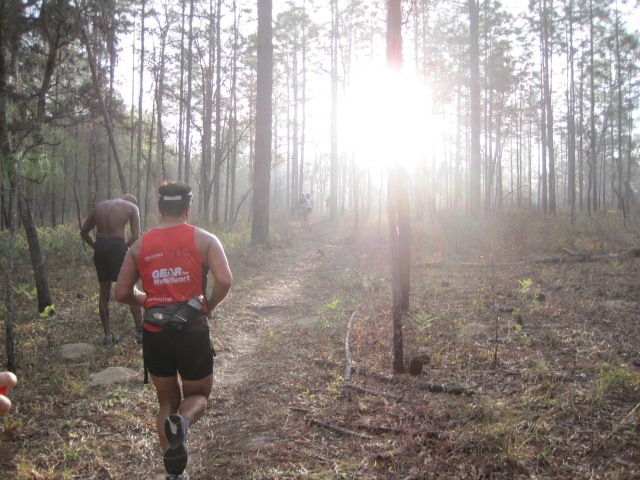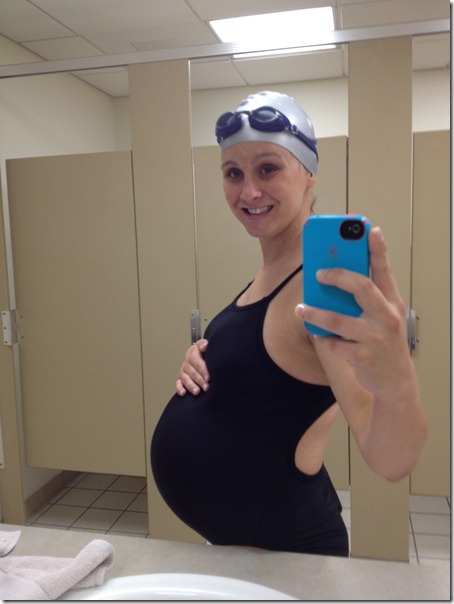Do you exercise when you’re sore?
Muscle soreness that occurs a day or two after working out is called Delayed Onset Muscle Soreness and is caused by small tears inside the muscles. While this is normal, if you are really sore, it’s a good idea to take some time off to allow your muscles to repair (source). If you’re just a bit sore, your body will benefit from light activity, like stretching or a walk (source). Even if you’ve got DOMS, some movement is good for you – the increased blood flow can speed healing and make you feel less sore overall (source).

Personally, I usually don’t work out if I’m really sore, or I will work out a different muscle group. My upper body is always sore after swimming, so I follow up with a run or bike. I never work out when I’m exhausted – it just makes me feel worse!
Do you exercise when you’re sick?
Check out two oldies but goodies —> Can I Run When I’m Sick? and Can Exercise Make You Sick? The general consensus is that if your cold is above the neck (i.e. congestion), you’re okay to run. If your cold is below the neck (chest congestion, intense coughing, vomiting, or diarrhea), you should continue to rest and let the illness run its course. (Source)

Exercise is, of course, good for you in a number of ways. One benefit of exercise is that boosts your immune system and helps prevent illness. In fact, exercise actually increases the production of immunoglobulins (antibodies that attack illness on a cellular level). Exercise also boosts the production of natural killer cells, which fight cancer. (Source) Interestingly enough, intense exercise actually suppresses the immune system. The suppression can last anywhere from a few hours to several days; the length of the suppression seems to be directly related to how hard and how long you engage in exercise. That’s why many people catch colds following a marathon!
I usually skip working out when I’m sick – I don’t want to make it worse, and all I really want to do is sit on the couch and watch episodes of House of Cards. ![]()
Do you exercise when you’re pregnant?
The rule of thumb is that, if you have a normal pregnancy, you can continue your pre-pregnancy exercise routine while pregnant. You can start an exercise routine, too, but it shouldn’t be too intense. Here are the 13 Rules of Safe Pregnancy Exercise. Additionally, while a lot of women follow a heart rate rule (i.e. don’t get your heart rate above a certain number), I’ve read that it’s better to simply never work out to an intense level on a scale of perceived exhaustion (so if 1 is sitting on the couch watching House of Cards and 10 is an all-out sprint, stick to a 6 or 7).
I exercised the entire time I was pregnant BUT I stopped running in Week 16 or so because it made the ligaments in my hip hurt. I swam and walked up until 2 days before I delivered, and I definitely think being active helped me give birth safely.
Do you exercise when you’ve got your period?
Here’s a really great article on how your period is impacted by high-activity sports (and how your period impacts your fitness). Interestingly enough….
Turkish researchers surveyed 241 elite athletes about how their menstrual cycle affected their performance. While nearly three out of four women said they felt worse just before menstruation, 63 percent said that their pain decreased during training and competition and 62.2 percent said that they believed their performance was just as good when they had their period as other times of the month. A West Virginia University study found that female runners performed equally well whether tested during the first half or second half of their menstrual cycles. (Source)

I exercise during Shark Week, but my energy levels are normally pretty low, so I take it easy. I do think exercise helps alleviate cramping and bloating.
So – what about you? Do you exercise when you’re sore, sick, or have your period? Did you exercise through pregnancy? What stops you from exercising? Or do you never miss a workout if you can help it?


My sister-in-law was able to keep running through her first pregnancy, but during her second, she couldn’t. (Her doctor put her on bed rest towards the end of this one because she was having lots of swelling. Turned out that she developed gestational diabetes after they tested for it. ) I think the best rule of thumb for all three of these is to listen to your body. Pain exists for a reason.